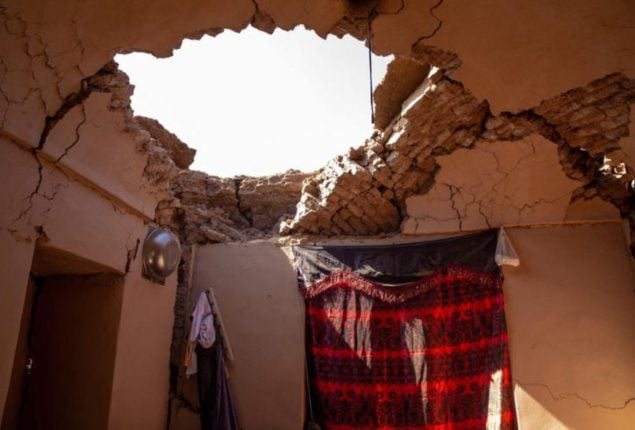Israel Declares ‘Complete Siege’ on Gaza: No Electricity, Food, or Fuel
Israel imposes comprehensive blockade on Gaza Strip in response to Hamas attack....

Afghanistan Earthquake Death Toll Could Rise, Aid Groups Warn
International humanitarian organizations are working urgently to assist survivors of the recent earthquake in western Afghanistan.
This devastating earthquake, with a magnitude of 6.3, occurred on Saturday, impacting an already war-torn and economically struggling nation.
The quake resulted in over 2,000 fatalities and left numerous individuals injured. This event is one of the deadliest earthquakes Afghanistan has experienced in quite some time.
Distressing images depict extensive destruction, with buildings reduced to piles of debris and rubble, while survivors have sought refuge in the streets for safety.
“The situation is worse than we imagined with people in devastated villages still desperately trying to rescue survivors from under the rubble with their bare hands,” said Thamindri de Silva, national director at World Vision Afghanistan.
Reinforcements from the capital Kabul had arrived to help, de Silva added, “but there was only one hospital and it was at full stretch with serious cases being transferred to other private facilities in the city.”
“Our colleagues and their families are processing this devastation in their hometowns and yet we are responding with everything we have,” de Silva said. “People need urgent medical care, water, food, shelter, and help to stay safe.”
Mark Calder, World Vision Afghanistan’s advocacy lead, told CNN that the earthquakes were “yet another devastating episode, after decades of conflict, successive droughts, and a collapsed economy.”
Funding from the international community, he added, “has been inadequate.”
“Organizations like ours can provide relief and help recovery but without a commitment from international governments and donors, more will fall into humanitarian need, displacement will increase and lives will be lost. The world must not look away now.”
UN agencies and their partners are actively engaged in emergency operations, and they are in the process of dispatching additional teams to bolster the ongoing humanitarian response, as stated by Stéphane Dujarric, spokesperson for the UN Secretary-General.’
“We are coordinating with the de facto authorities to swiftly assess needs and provide emergency assistance,” Dujarric said.
UN Secretary-General António Guterres on Sunday expressed solidarity and called on the international community to “come together and support Afghans impacted by the earthquake – many of whom were already in need before this crisis,” he added.
UNICEF, the United Nations Children’s Fund, has sent out 10,000 hygiene kits, 5,000 family kits, 1,500 sets of winter clothing and blankets, 1,000 tarpaulins, as well as essential household items to support the existing humanitarian initiatives.
Furthermore, teams are actively conducting additional on-site evaluations and delivering emergency drugs and tents to relieve the strain on overwhelmed healthcare facilities.
“We will make every effort to bring quick relief to those affected,” said Fran Equiza, its representative in Afghanistan.
On Sunday, Taliban spokesperson Zabihullah Mujahid reported that the earthquake had resulted in 2,053 fatalities, with over 1,240 people injured and approximately 1,320 houses either completely or partially destroyed. However, there is growing concern that these numbers may increase further.
Afghanistan, a country that has long grappled with poverty, has been mired in conflict for decades. The Taliban assumed control in August 2021, marking their return to power two decades after being ousted by US forces.
This event prompted the withdrawal of many major aid organizations and NGOs, leading to the suspension of critical aid programs.
The Taliban’s takeover exacerbated Afghanistan’s isolation from the international community, and it resulted in a cutoff of international funding by Washington and its allies. This economic blow further weakened an already aid-dependent economy.
The country also remains vulnerable to regular earthquakes. Last June, a 5.9 magnitude earthquake in the eastern provinces of Paktika and Khost, bordering Pakistan, claimed the lives of over a thousand people.
Recently, the World Bank warned that two-thirds of Afghan families were facing significant challenges in sustaining their livelihoods, making it even more difficult for the Afghan population to recover from the impact of earthquakes, which have become a recurring occurrence in the region.
International aid groups have expressed their limitations in responding to major disasters due to the challenges posed by the Taliban’s takeover.
They have called for urgent global assistance, but only a few countries have publicly offered their support.
Neighboring China in a statement issued on Sunday by its foreign ministry said that it would do “its best to assist in Afghanistan’s disaster-relief efforts in light of its needs.”
To stay informed about current events, please like our Facebook page https://www.facebook.com/BOLUrduNews/.
Catch all the International News, Breaking News Event and Latest News Updates on The BOL News
Download The BOL News App to get the Daily News Update & Follow us on Google News.